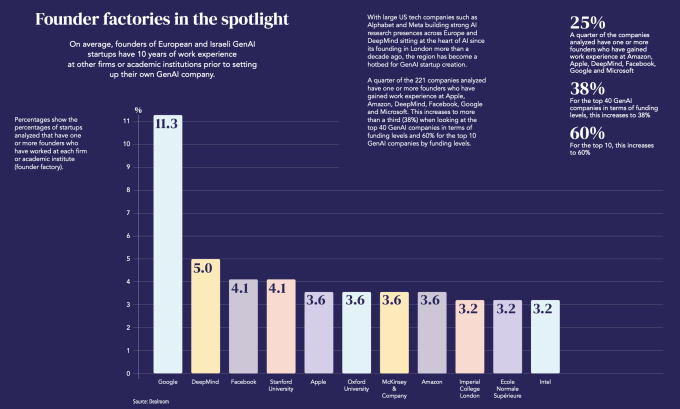Love it or hate it, artificial intelligence – especially generative AI – is the technology story of 2024.
OpenAI, with the rollout of viral services like ChatGPT and billions in funding, may have absorbed the lion’s share of attention and money so far. But according to a new report from top VC Accel and Dealroom analysts, there is a wave of hopefuls looking to make their mark in Europe and Israel.
Together, Europe and Israel account for about 45% of all venture capital funding annually, but if you translate that to the specific area of AI, that share drops to less than half of that – and generative AI even less. You can interpret that as a signal that Europe and Israel are lagging behind the market. Or more optimistically, it means we’ll see some interesting developments in the coming months and years as the region catches up.
Investors are now on the hunt for the next big thing, possibly at prices that are lower than in the US. Interestingly enough, Accel partner Harry Nelis tells me that one of the reasons this report became a reality is his company’s efforts to evaluate all generative developments. AI startups are springing up across the region. Here’s what they learned as they tried to determine what to finance:
London has generated the most GenAI startups.
Of the 221 startups analyzed by Dealroom and Accel, around 27%, almost a third of the group, were founded in London.
Tel Aviv took number two with 13%; Berlin 12%; and Amsterdam 5%. Interestingly, while Paris is the city everyone has been talking about for a while as a hotbed for AI development, it was in the middle of the city rankings at 10%.
But those Parisian startups are packing a punch.
The GenAI startups founded in France raise the most money.
Collectively, French startups that describe themselves as working in the field of generative AI have raised $2.29 billion to date, the most of any country in Europe, and more than Israel. In recent rounds, Mistral AI raised $640 million earlier this month, on top of the $500 million previously; and “H” amazingly raised a $220 million seed round a few weeks ago. Meanwhile, core player Poolside, which moved its headquarters from the US to Paris last August, is also reportedly making a significant round.
Other notable AI startups in Paris include Hugging Face, the open-source repository for machine learning models, which raised $235 million in August 2023, and a new research-focused organization called Kyutai, which itself is armed with hundreds of millions euros to make some noise in open-source AI models.
Why do some places perform so much better than others?
In total, France’s $2.29 billion is almost as much as the next three countries raised together. The UK has seen $1.15 billion in funding for generative AI startups (Stable Diffusion maker Stability AI, Synthesia and PolyAI are among the bigger players in the region); Israel has made $1.04 billion thanks to startups like AI21 and Run:ai, which Nvidia recently acquired; and German raises have reached $636 million, with Aleph Alpha’s $500 million round last year accounting for the majority of that amount.
In addition, other countries in the region have raised less than $160 million each – sometimes significantly less, with some countries in Europe seeing total funding in the low seven figures.
Nelis believes the numbers reflect where some of the strongest educational institutions are located, producing a lot of tech talent, as well as big tech companies setting up their own operations to tap into that talent.
“You see the importance of real long-term investments in education that bring in a lot of founders in Paris,” Nelis said. “The same applies to the food in London at schools such as Cambridge, Oxford and UCL.”
However, the step between universities and founders is not immediate: the middle phase for many was working at large tech companies, which focused on improving recruitment.
“Universities are clearly very important for attracting hyperscalers,” Nelis said, citing Facebook/Meta early on setting up its AI research labs in Paris, and Google eventually setting up a similar setup there, having already established an operation with DeepMind had built up. in London and Paris.
“Founder factories” – hyperscaler technology companies – are a big part of the story.
While startups may feel like the crucible of AI development, big tech plays an important role in fanning the flames.
Looking at the long tail of GenAI startups, about 25% of them have founders who previously worked at Alphabet (DeepMind or Google), Apple, Amazon, Meta or Microsoft – let’s call the group MAAMA.
The higher you go, it gets even more clubby. Among the top 10 of these startups, as many as 60% of the founders come from one of the MAAMAs.
One company in particular – Google – stands out as a clear feeder of AI, surpassing even some of the most prestigious universities in the world when you add up the number of people involved.

MAAMA mia! It’s not a brilliant message for outsiders and outliers – although that too will likely evolve and expand as the field matures and grows.
